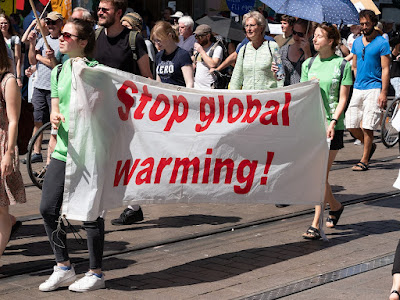The Summer of Epic Heat: Urgent Actions Needed to Address Climate Change, Including Plant-Based Solutions
"Adopting veganism is an eco-conscious choice with global impact. By embracing plant-based diets, we curtail deforestation, conserve water, and slash greenhouse gas emissions, mitigating climate change and fostering a sustainable future, in fact, it is one of the best things any one person can do to fight the climate crisis.''
- Michael Corthell
The summer of 2023 has delivered unprecedented heat waves and extreme weather events, underscoring the urgency of addressing climate change. Our familiar climate has transformed into something new and ever-changing, with profound consequences for both humans and nature.
To mitigate these effects, it is crucial to understand the historical significance of these extreme conditions and the necessity for immediate global action. Among the solutions, transitioning to plant-based diets, like veganism, emerges as one of the best ways to combat climate change.
Uncharted Territory: Historical Context of Unprecedented Heat
This year's soaring temperatures might mark the hottest month in 120,000 years, signifying an uncharted territory in human history. With nearly half of the United States under a heat advisory, it is clear that the predictions of intensified wildfires, floods, and storms due to climate change have become a grim reality.
Climate-Induced Disasters: A Glimpse of the Future Climate change-related disasters are on the rise in frequency and intensity. Smoke from Canadian wildfires has blanketed a large portion of the US, triggering evacuations in Greece. Vermont, an area not accustomed to flooding, and Boston inundated by torrential rain, have felt the brunt of these extreme events. While the West Coast experienced a temporary respite from wildfires due to early-year rainfall, experts warn that more heatwaves loom in the future.
The Growing Public Health Concern Escalating temperatures pose severe public health risks. Regions like Arizona's Phoenix, enduring consecutive days of 110-plus-degree temperatures, face grave health implications. The impact is visible with dying cacti, overwhelmed hospitals, and an increase in heat-related fatalities. Urgent actions are necessary to prevent heat waves from surpassing the limits of human physiological tolerance.
The Urban Heat Island Effect: Challenges in Cities Urban centers, being economic hubs, are also heat hotspots. The urban heat island effect exacerbates heatwaves within cities, creating stark temperature disparities over short distances. Asphalt, buildings, and industry absorb and radiate more heat, intensifying the severity of heat waves. Innovative approaches like painting roads and roofs white are crucial to mitigate this effect.
The Urgency of Climate Action and Veganism While a majority of Americans prioritize protecting the environment, there is still a lingering focus on economic growth that hampers climate change mitigation efforts. Overcoming the partisan divide on climate change is crucial to developing comprehensive and urgent action plans.
One of the most effective ways individuals can contribute to mitigating climate change is by adopting plant-based diets, such as veganism.
Agriculture, especially livestock farming, is a significant contributor to greenhouse gas emissions. By reducing reliance on animal-based products and embracing plant-based alternatives, we can significantly reduce our carbon footprint. Studies show that shifting to a vegan diet can lower greenhouse gas emissions, conserve water resources, and alleviate deforestation caused by the meat and dairy industries.
Summary The summer of epic heat serves as a stark reminder of the pressing need to combat climate change. Urgent and bold actions are required to limit global warming, transition away from fossil fuels, and build resilient communities to adapt to the changing climate. Embracing plant-based diets, like veganism, is one of the best ways individuals can make a positive impact on the environment. By collectively working towards a sustainable future, we can create a greener, healthier world for future generations.
Resources
Climate Change:
- Intergovernmental Panel on Climate Change (IPCC): https://www.ipcc.ch/
- National Aeronautics and Space Administration (NASA) Climate Change: https://climate.nasa.gov/
- United Nations Framework Convention on Climate Change (UNFCCC): https://unfccc.int/
- Environmental Protection Agency (EPA) - Climate Change: https://www.epa.gov/climate-change
- World Meteorological Organization (WMO): https://public.wmo.int/en
Veganism and Environmental Impact:
- United Nations Environment Programme (UNEP) - Food and Environment: https://www.unep.org/explore-topics/resource-efficiency/what-we-do/sustainable-food-systems
- World Wildlife Fund (WWF) - Food and Climate: https://www.worldwildlife.org/pages/food-and-climate
- Oxford University - Our World in Data: Land Use and Climate Change: https://ourworldindata.org/land-use-and-climate-change
- The Vegan Society - Environmental Impacts of Animal Agriculture: https://www.vegansociety.com/go-vegan/why-go-vegan/environment




Comments
Post a Comment
We welcome your input!